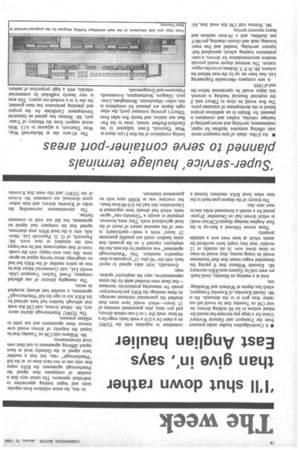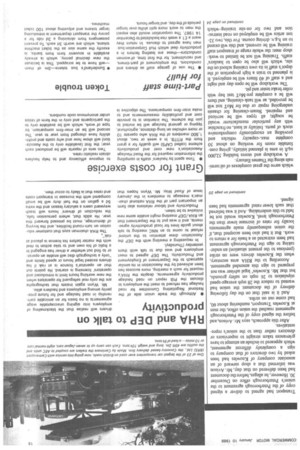'I'll shut down rather than give in', says East Anglian haulier
Page 20

Page 21

If you've noticed an error in this article please click here to report it so we can fix it.
• A Cambridgeshire haulier under pressure from the Transport and General Workers' Union for a large pay increase has issued dismissal notices to his 60 striking drivers; he told CM on Tuesday that he would sell out rather than give in to the demands. He is Mr. Gerald Knowles, of Knowles Transport, which has depots at Wisbech and Wirnblington.
And at a meeting on Monday, local hauliers were told by Eastern area RHA secretary Mr. Kenneth Williams that if paying the demanded wages meant that their businesses would be losing money, they would be wiser to close down now. In six months or 12 months' time they might have sacrificed the assets which at least were now a saleable property.
These moves followed a flare-up in the East Anglian haulage dispute (CM last week) in which drivers had on December 29 postponed for a month a threatened strike due to start next day.
The history of the dispute goes back to the time when local RHA members formed a committee to negotiate with the TGWU on a claim for a £16 a week basic wage for a 40-hour week (for 1-to-5-ton-vehicle drivers, and pro rata), plus guaranteed overtime of 15 hours—which would have more than doubled the guaranteed minimum earnings. At these meetings the RHA put forward proposals for measuring productivity increases —but these were brushed aside by the union representatives, says the employers' spokesman.
Eventually, both sides agreed to report back with the "40 plus 15" proposals to their respective members. This "Peterborough agreement" was accepted by the men, but the employers rejected it on the grounds that some hauliers could not possibly guarantee 55 hours' work a week—particularly in view of the seasonal nature of much of the local agricultural work. They were, however, prepared to accept a "Grimsby-rate" agreement, which had already been negotiated in Lincolnshire; this had the £16 40-hour basic, but overtime was at RH88 rates with no guaranteed minimum. At this, the union withdrew from negotiations and began making approaches to individual operators. The union says that a number of companies then signed the Peterborough agreement; the RHA states that only one or two have done so at the full "Peterborough" rate, but that a number have signed at the Grimsby level or have signed differing agreements to suit their own local circumstances.
Mr. Williams told CM on Tuesday that he hoped the majority of drivers would now honour these agreements and not yield to militant pressure.
The TGWU Peterborough district secretary, Mr. Alfred Avison, told CM this week that although hauliers had been advised by the RHA not to sign the full "Peterborough" agreement, a number had already accepted its terms.
The managing director of one affected company, Frank Taylors Transport (Ailsworth) Ltd., told Commercial Motor that he was an active member of the RHA but had no misgivings about having signed an agreement. His men were happy with the conditions of their employment and he was happy with the standard 01 their work. Mr. Papworth, of G. G. Papworth Ltd., Mereside, who is the local RHA area chairman, agreed that his company had signed an agreement, but did not wish to comment further.
The circumstances surrounding the strike of Knowles drivers, and their subsequent dismissal, are contested. Mr. Avison of the TGWU said this week that Knowles Transport had agreed to deliver a signed copy of the Peterborough agreement to the union's Peterborough office on December 30. However, he alleges, before the document had been delivered on that day, Mr. Avison was informed that a shop steward of an associate company of Knowles had been asked by two directors of that company to sign a completely different agreement, which appeared to include an attempt to have grievances taken straight to supervisors or directors rather than to the union's representatives.
After this approach, says Mr. Avison, and before the signed copy of the Peterborough agreement reached the union office, the men at Knowles Transport, numbering about 60, had come out on strike.
And it is said that on the day following delivery of the document the union had wanted to reduce the 28 mph average-speed stipulation to 26 mph on safety grounds, but that Mr. Knowles' legal adviser was not prepared to sign this amended agreement_ According to the RBA area secretary, when the Knowles drivers were on strike (previous to the present situation) an undertaking to sign the Peterborough agreement had been extracted as a basis for a return to work. But it had also been accepted that, if the union subsequently made agreements locally for rates of increase lower than the Peterborough level, Knowles would not be held to this undertaking. And it was believed that such lower-rated agreements had been signed.
continued on page 20








































































































